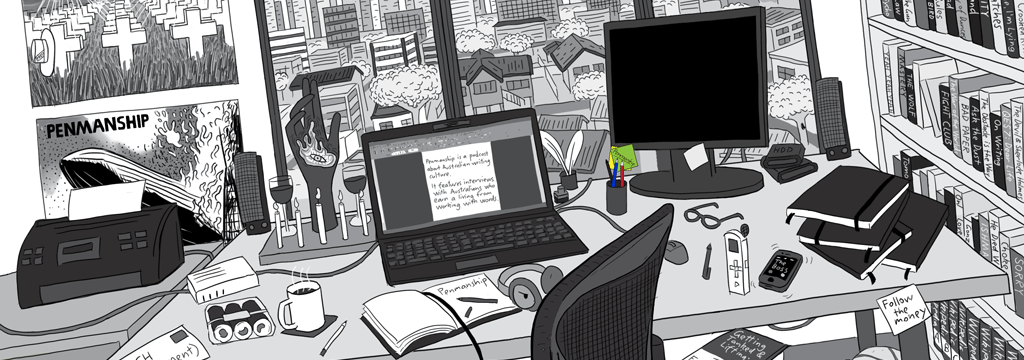John Birmingham is an author, columnist and freelance journalist.
 Since I began venturing into freelance journalism six years ago, John has loomed large in my life. At first, I admired him from afar by devouring his autobiographical books, including his cult classic He Died With A Felafel In His Hand and its sequel, The Tasmanian Babes Fiasco. I read his journalism in magazines like The Monthly, his online columns on Brisbane Times, his cannabis travelogue Dopeland and his collection of essays with the memorable title, Off One’s Tits.
Since I began venturing into freelance journalism six years ago, John has loomed large in my life. At first, I admired him from afar by devouring his autobiographical books, including his cult classic He Died With A Felafel In His Hand and its sequel, The Tasmanian Babes Fiasco. I read his journalism in magazines like The Monthly, his online columns on Brisbane Times, his cannabis travelogue Dopeland and his collection of essays with the memorable title, Off One’s Tits.
All of that writing was rooted in reality. In 2010, I also read one of John’s fiction titles, After America, and I leveraged my interest in that release, and in John’s work in general, into a short feature article for The Big Issue that same year. That’s where I first met John Birmingham: as a young freelancer interviewing him for a national magazine. I was thrilled by this opportunity, because I was essentially being paid to interview one of my favourite Australian writers.
In 2015, John remains a giant of the literary scene, a true chameleon who can jump between fiction and non-fiction, short-form and long-form, with enviable ease. He’s an outrageous talent and I’m honoured to consider him a freelance colleague and a friend. He’s someone who has seen and done it all, as far as Australian writing is concerned, yet he maintains a freakishly prolific output and a young man’s hunger for the craft. For me, he remains a source of inspiration as dependable as the tides.
Our interview took place at John’s home, in the inner-east suburb of Balmoral on a Tuesday morning in April . He led me downstairs to his writing room, which features an enormous floor-to-ceiling book shelf stacked with titles and a couple of awards he’s earned over the years. John kicked his dog out of the room so she didn’t stink up the place, and we settled into comfortable chairs opposite one another for a conversation which touches on his upbringing in Ipswich, Queensland; his early interest in writing, which led him to manually copy some of his favourite writers line-by-line; his move from journalism into fiction writing, and his short-lived job as a producer for the national television program A Current Affair.
John Birmingham has published lots of books. So many that he sort of loses track of them. He wrote features for magazines in a decade before publishing He Died With A Felafel In His Hand, working for Rolling Stone, Playboy and the Long Bay Prison News amongst others. He won the National Award For Non-Fiction with Leviathan: An Unauthorised Biography of Sydney. He started writing airport novels because they were more fun. His most recent series of books that improve with altitude are the Dave Hooper novels. He blogs at cheeseburgergothic.com.
John Birmingham on Twitter: @JohnBirmingham
Above photo credit: Orion Zuyderhoff-Gray for The Native Press.
Direct download | iTunes | Stitcher | Libsyn | YouTube
Timeline:
3.20: John’s current writing commitments in 2015
5.50 John’s Sydney Morning Herald column: “They wanted me to be wry and droll; I pretend I’m wearing a smoking jacket while I write it.”
7.30 John’s fictional character Dave Hooper emerged after he was asked to write a franchise character
8.40 He’s currently looking at writing another three Dave Hooper novels
9.15 In September/October 2014, John was working on three books at the same time. “It was kind of a headfuck.”
11.30 John’s first love was magazine writing, but as a parent of two teenagers, his freedom to “pack up for two weeks and piss off overseas to cover a story is non-existent.”
12.50 There’s no point in whingeing about low payrates for freelancer writers; John has decided to concentrate on book writing instead
14.00 Magazine writers need between four and six regular sources of income to make the work viable
15.00 “Blind panic was a familiar feature of that period in my life, and it really only ended when I started to say no to people.”
15.50 John recently returned an advance to a publisher for a non-fiction book
16.45 On productivity strategies: “There’s nothing romantic about it anymore; it’s just time management.”
17.30 Pomodoro time management technique: writing a 33,000 word e-book in two weeks.
18.45 “I like to give myself a minimum of 3,000 words a day; it’s not an unreasonable amount”
21.20 John wrote Leviathan while living in Sydney and working at the State Library every weekend
22.40 “Felafel was written almost entirely between the hours of 10pm and 4am, with a neuro-chemically enhanced system.”
23.45 In John’s 20s, when he was trying to establish himself as a writer, “everything had to be about the writing.”
26.20 “The work you’re doing at the end of the day is not really as good as the work at the start, when you’re fresh.”
27.20 The “irrational conceit” of writing for a living in the age of free online content
32.00 John’s first conception of wanting to make a living from working with words after reading Stephen King’s The Stand
33.30 John recommends On Writing by Stephen King as a how-to manual for young writers
34.10 John’s mother worked a receptionist at a doctor’s surgery; his father worked in a factory
35.00 Working in Canberra at the Department of Defence in a section that dealt with security clearances
36.00 Growing up in Ipswich, Queensland and reading encyclopedias
38.45 John’s younger brother, Andrew Birmingham, works as a technology journalist and blogs at WHICH-50
40.45 Copying out the words of John O’Grady in high school: They’re A Weird Mob, the first book that made John laugh out loud
43.45 The benefits that John gained from this process of copying out his favourite writers
46.00 John’s first paid job at Myer Indooroopilly as a Christmas casual worker, selling chocolate
48.15 Another job working as a newspaper reader, pre-internet, at the University of Queensland
50.00 John had started freelancing around this point, so having a job reading newspapers was good preparation
50.50 Working at Rolling Stone’s loading dock while freelancing for the magazine
52.10 “I started writing pretty early, and I was determined that I was going to be a writer. I couldn’t call myself a writer if I was waiting tables.”
52.30 Working as a producer on A Current Affair during the Jana Wendt years. “I’m very glad I did it, and I’m very glad they kicked me out.”
54.00 John’s ambitions to work on Four Corners during the Chris Masters era
55.30 John’s reportage for Rolling Stone at the time was “grungy, street-level reporting” about homelessness and gay bashing
56.30 The reason why John left A Current Affair after being assigned a story on liquid toxic waste
61.50 John’s story for Rolling Stone about neo-Nazis which resulted in legal action against the publication
63.30 “It came out, and it upset the Nazis, as you’d imagine. But they were a bunch of dumb cunts; we’d written ‘John Birmingham is a Melbourne-based writer’.”
65.45 Why John felt personal responsibility for exposing Rolling Stone to that legal action
67.00 “I always tell young journalists is that the story you most want to believe is the one of which you should be most sceptical.”
67.50 When John began earning serious cash from writing at age 30, after being poor throughout his 20s as a freelancer
71.00 The origins of He Died With A Felafel In His Hand, written in 1994 to a five-week deadline for a $4,000 advance
73.40 John handed in the Felafel manuscript on the night before his 30th birthday
74.50 “I’d been so used to living close to the bone for so many years that when I finally had money in my account, I couldn’t find stuff to spend it on”
77.20 The apparent ease with which John can switch between fiction and non-fiction, and how he balances the two styles
79.00 John’s ideal business card would include his name and the phrase,“Things found out, stories written.”
81.50 John’s job with writing the weekly Sydney Morning Herald column was to fill the “enormous hole” that Mike Carlton had left
85.30 How John approaches writing honestly about himself and aspects of his behaviour: drug use, sexual performance and losing weight
86.30 “There’s nothing duller than a middle-aged columnist writing about his home life; fuck me, that’s usually a sign they’ve run out of stuff to talk about.”
87.10 John’s wife is a lawyer for the government, which occasionally stops him from writing about certain things that she’s working on
88.00 “That stuff about weight loss, for instance; that was something I had to do, or it was going to kill me, if I kept all that weight on.”

